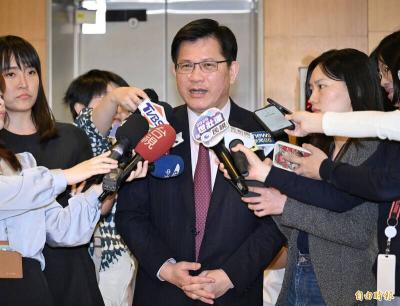The Democratic Progressive Party (DPP) caucus yesterday called for full transparency during negotiations with China on a planned economic pact.
The comments came after Minister of Economic Affairs Yiin Chii-ming (尹啟銘) admitted during a forum held to promote the economic cooperation framework agreement (ECFA) in Taipei on Sunday that the government had been in contact with China on the planned accord.
He did not provide further information about the agreement for fear that revealing too many details could jeopardize the cross-strait trade talks.
Yiin’s remarks raised eyebrows because MAC Chairwoman Lai Shin-yuan (賴幸媛) had previously said that once the economic ministry completed the consultation process with the public and industries, as well as the evaluation process, the ministry would make a presentation to the legislature before engaging in talks with Beijing.
DPP caucus whip Lee Chun-yee (李俊毅) told a press conference that Yiin’s admission the government had already been in contact with China was surprising and frightening.
“The government has already been discussing the matter with China for a period, but refused to make public what they were talking about,” Lee said, adding the KMT government had engaged in “secret politics” with China.
Lee called for full transparency during the negotiation process.
While the ministry has solicited domestic opinion on an ECFA, it has excluded voices from the DPP in the discussions, Lee said.
Lee said the DPP caucus asked the ministry to provide a report to the legislature on the current process of the negotiations.
He said the DPP estimated that 4 million jobs would be under threat if the economic treaty were signed and the government should not ignore the warning.
DPP Legislator Pan Meng-an (潘孟安) quoted Yiin as saying Taiwan’s GDP could increase by 1.374 percentage points after the signing of an ECFA, without elaborating what the estimate was based on.
Meanwhile, the Mainland Affairs Council (MAC) yesterday downplayed Yiin’s remarks, saying they were just casual exchanges at academic occasions.
MAC Deputy Minister Liu Te-shun (劉德勳) said that his understanding was that the exchanges between officials of the Ministry of Economic Affairs and their Chinese counterparts were made during seminars.
Since his council was not present at the event, the media should ask the ministry for more details about the conversations.
Liu said that his council has not yet authorized the Straits Exchange Foundation (SEF) to negotiate with Beijing on signing an ECFA and that it was not certain whether the issue would be discussed in the next high-level talks between the SEF and its Chinese counterpart the Association for Relations Across the Taiwan Strait.
The meeting was scheduled for either May or June.
As the government is still in the process of soliciting public opinion, Liu said it could begin talking with Beijing on the planned accord after obtaining public consensus over the issue.

Taiwan would welcome the return of Honduras as a diplomatic ally if its next president decides to make such a move, Minister of Foreign Affairs Lin Chia-lung (林佳龍) said yesterday. “Of course, we would welcome Honduras if they want to restore diplomatic ties with Taiwan after their elections,” Lin said at a meeting of the legislature’s Foreign Affairs and National Defense Committee, when asked to comment on statements made by two of the three Honduran presidential candidates during the presidential campaign in the Central American country. Taiwan is paying close attention to the region as a whole in the wake of a

Chinese Nationalist Party (KMT) Chairman Eric Chu (朱立倫), spokeswoman Yang Chih-yu (楊智伃) and Legislator Hsieh Lung-chieh (謝龍介) would be summoned by police for questioning for leading an illegal assembly on Thursday evening last week, Minister of the Interior Liu Shyh-fang (劉世芳) said today. The three KMT officials led an assembly outside the Taipei City Prosecutors’ Office, a restricted area where public assembly is not allowed, protesting the questioning of several KMT staff and searches of KMT headquarters and offices in a recall petition forgery case. Chu, Yang and Hsieh are all suspected of contravening the Assembly and Parade Act (集會遊行法) by holding

President William Lai (賴清德) has appointed former vice president Chen Chien-jen (陳建仁) to attend the late Pope Francis’ funeral at the Vatican City on Saturday on his behalf, the Ministry of Foreign Affairs said today. The Holy See announced Francis’ funeral would take place on Saturday at 10am in St Peter’s Square. The ministry expressed condolences over Francis’ passing and said that Chen would represent Taiwan at the funeral and offer condolences in person. Taiwan and the Vatican have a long-standing and close diplomatic relationship, the ministry said. Both sides agreed to have Chen represent Taiwan at the funeral, given his Catholic identity and

Taiwan would welcome the return of Honduras as a diplomatic ally if the next president of that country decides to make such a move, Minister of Foreign Affairs Lin Chia-lung (林佳龍) said today. “We would welcome Honduras if they want to restore diplomatic ties with Taiwan after their elections,” Lin said during a legislative hearing. At the same time, Taiwan is paying close attention to the Central American region as a whole, in the wake of a visit there earlier this year by US Secretary of State Marco Rubio, Lin said. Rubio visited Panama, El Salvador, Costa Rica and Guatemala, during which he